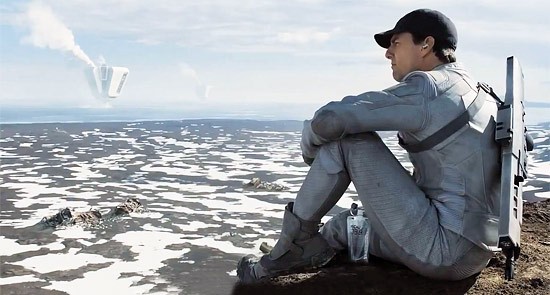
 The official plot synopsis for Oblivion, a large, expansive, empty-looking science fiction movie featuring Tom Cruise as one of the last human beings on earth, describes the relationship between its protagonist and his love interest as “a connection that transcends logic.”
The official plot synopsis for Oblivion, a large, expansive, empty-looking science fiction movie featuring Tom Cruise as one of the last human beings on earth, describes the relationship between its protagonist and his love interest as “a connection that transcends logic.”
In layman’s terms this generally means “didn’t put a lot of thought into it.” It came as something of a surprise to discover director Joseph Kosinski’s follow-up to his eye-boggling Tron: Legacy (2010) is a big-thinking movie that touches on several knotty themes: constructed realities, God and the “creator”, nature versus science and the pernicious influence of drones, which are rendered like angry-looking versions of Pacman crammed into square slabs.
Set in a post-apocalyptic 2077, the earth has been decimated by a war against aliens. The hurlyburly is done, the battle lost and won (by us) — but the bastards smashed our moon and most habitable land fried like a leaf torched by a flame thrower, so mankind shuffled off to another planet.
Jack Harper (Cruise) is a repairman for drones that whiz around making cranky sounding noises and kill stray alien life forms known as “scavs” (think Predator crossed with the Sand People).
He lives in a sleek abode and has a pretty good life — no annoying neighbours, a sexy girlfriend, a cool flying machine, and a bike strategically inserted to subliminally remind viewers it’s from the same dude who rebooted Tron — until one day beneath the surface Jack discovers two things: a book and another human, which inspire him to act a little more knowledgeable and a little less self-centric.
The resulting plot twists, which arrive after gaping chasms in Oblivion’s barren landscape and procrastinating pace, will be familiar to anybody reasonably well-versed in SCI-FI. Kosinski wanted to make a patient US$100+ million blockbuster art movie, dripping with atmosphere, cut open with plenty of air to breathe, plenty of space between the characters and a heft of ambition to make something more than expendable eye candy. Morgan Freeman, in a small role, chips in one for the team, his character oddly reminiscent of Red from The Shawshank Redemption (1994): jailed by circumstance, with a view to a fatalistic but sort-of positive future.
Noble ambitions, but Oblivion is also slow, heavy-handed and stiff-jointed, prone to admiring the scenery and populating it with bits and pieces plucked from a smorgasbord of post-apocalyptic interplanetary reality-bending cuisine: 2001: A Space Odyssey (1968), The Matrix (1999), Moon (2009) and WALL-E (2008) the favoured dishes. Despite fresh packaging and pretty pictures (it looks a treat on an IMAX screen) there is an unshakable sense that the contents of the box remain deeply familiar.
Oblivion’s Australian theatrical release date: April 11, 2013.







Crikey is committed to hosting lively discussions. Help us keep the conversation useful, interesting and welcoming. We aim to publish comments quickly in the interest of promoting robust conversation, but we’re a small team and we deploy filters to protect against legal risk. Occasionally your comment may be held up while we review, but we’re working as fast as we can to keep the conversation rolling.
The Crikey comment section is members-only content. Please subscribe to leave a comment.
The Crikey comment section is members-only content. Please login to leave a comment.